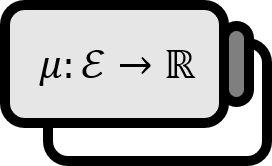Egorov's Theorem
Theorem1 2
Let a measure space $( X , \mathcal{E} , \mu)$ be given, and let $\mu$ be a finite measure.
If a sequence of measurable functions $\left\{ f_{n} : X \to \mathbb{R} \right\}_{n \in \mathbb{N}}$ converges to a measurable function $f$ almost everywhere on $X$, then $f_{n}$ converges to $f$ almost uniformly and in measure.
Explanation
This theorem essentially states that for measurable functions, pointwise convergence and uniform convergence are almost the same.
Proof
Without loss of generality, assume that $f_{n}$ converges to $f$ at every point in $X$. For two natural numbers $n , m \in \mathbb{N}$, define the following set $E_{n} (m) \subset X$: $$ E_{n} (m) := \cup_{k=n}^{\infty} \left\{ x \in X : \left| f_{k}(x) - f(x) \right| \ge {\frac{1}{m}} \right\} $$
Part 1. Convergence in Measure
According to the definition of $E_{n} (m)$, $E_{n+1} (m) \subset E_{n} (m)$, and since $f_{n} (x) \to f(x)$ for all $x \in X$, their infinite intersection is as follows. $$ \bigcap_{n=1}^{\infty} E_{n} (m) = \emptyset $$
Definition of convergence in measure: A sequence of measurable functions $\left\{ f_{n} : X \to \mathbb{R} \right\}_{n \in \mathbb{N}}$ is said to converge in measure to a measurable function $f : X \to \mathbb{R}$ if it satisfies the following for all $M >0$. $$ \lim_{n \to \infty} \mu \left( \left\{ x \in X : | f_{n}(x) - f(x) | \ge M \right\} \right) = 0 $$
Since $\mu (X) < \infty$ by assumption, it must be that $\mu \left( E_{n} (m) \right) \to 0$ when $n \to \infty$, hence $f_{n}$ converges to $f$ in measure.
Part 2. Almost Uniform Convergence
Definition of almost uniform convergence: A sequence of measurable functions $\left\{ f_{n} : X \to \mathbb{R} \right\}_{n \in \mathbb{N}}$ is said to converge almost uniformly to a measurable function $f : X \to \mathbb{R}$ if for each $\delta > 0$, there exists $E_{\delta} \in \mathcal{E}$ satisfying $\mu \left( E_{\delta} \right) < \delta$ such that $f_{n}$ converges uniformly to $f$ on $X \setminus E_{\delta}$.
For an arbitrary $\delta > 0$, define the natural number $n = k_{m}$ and the set $E_{\delta} \in X$ that satisfy the following. $$ \begin{align*} \mu \left( E_{k_{m}} (m) \right) =& {\frac{ \delta }{ 2^{m} }} \\ E_{\delta} =& \bigcup_{m=1}^{\infty} E_{k_{m}} (m) \\ \implies \mu \left( E_{\delta} \right) < & \delta \end{align*} $$ If $x \notin E_{\delta}$, then $x \notin E_{k_{m}} (m)$, and for all $n \ge k_{m}$, the following holds. $$ \left| f_{n} (x) - f (x) \right| < {\frac{ 1 }{ m }} $$ This means that $f_{n}$ converges uniformly to $f$ on $X \setminus E_{\delta}$, and thus $f_{n}$ converges almost uniformly to $f$.
■
